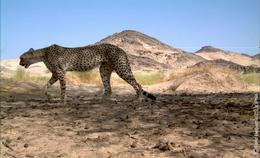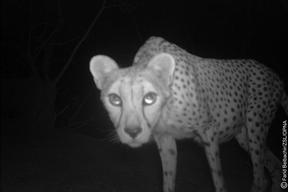A large-scale survey in the Sahara caught on camera a very rare subspecies of the cheetah living in North and West Africa

The rare photographs which were produced by state-of-the-art photo traps, photographed the cheetah of the Sahara in Algeria. This is what the Zoological Society of London (Zoological Society of London) and the Algerian National Parks Office (Office du Parc National de l'Ahaggar) said.
The photos were taken during a regional survey in the central Sahara covering an area of 2,800 square kilometers. This is the first systematic survey that includes photo traps. The rare photo captured a group of 4 cheetahs that were identified by the unique spots that each individual bears on its body.
The cheetahs of North Africa live in the Sahara desert and savannahs of North and West Africa, in countries such as Algeria, Niger, Mali, Benin, Burkina Faso and Togo. Their population is extremely sparse, with the largest group found in Algeria.

These animals are in real danger of extinction in the entire North African region. This is a very rare and elusive subspecies, almost nothing is known about them. Their population is estimated at less than 250 cats, this estimate is mostly based on educated guesses.
The research should help in expanding our knowledge about these animals, building a database that includes the population size, composition, living areas, and any other information. The survey will, to a large extent, also use the local population to obtain additional information about the ecology of the cheetahs as well as to identify the threats to them.

15 תגובות
The message is visible, shining from his eyes: keep your guards!
Nahum:
I didn't understand where exactly you were rowing.
In my opinion, any mixing of the term "natural" in the matter is a result of confusion and causes only confusion.
This word has no role in the considerations and therefore there is no point in delving into the different ways to interpret it.
Regarding the question of which species is worth the investment in its conservation and which is not - this can almost never be answered in advance. It is similar to the question of whether an investment in basic research in a particular field of science will ever yield results that have commercial value. The point is that the extinction of a species is irreversible, so it is usually better to make efforts to preserve it.
Why do we think it's bad?
That's exactly where I rowed
If we lose something valuable for example if we lose a species that we can extract value from
So you're right, we've lost a good thing regardless of the natural
And if it's not good because it's not natural
So it is natural
Nahum:
You are confusing (like many others) between "natural" and "good".
Almost all human activity is aimed at achieving results that are contrary to those that would have been obtained without his activity.
In other words - the person works so that the result is what he considers "good" and not what he considers "natural".
So maybe it's natural for an animal to become extinct but we think it's not good and so we work to prevent it.
Michael and Or
The exclamation mark is right on a certain level
It's true, letting whole regions disappear and whole species become extinct increases a lot of our knowledge of nature and it should be prevented
But fighting for the preservation of a subspecies that is longed for by many, just not exactly with the same gang on the back
It seems to me a bit exaggerated and hysterical
After all, at the end of the day there is always a natural choice
Do we also have to fight nature's selection processes?
Is it not part of the process of nature that man does actions that are destructive?
What is the difference between an earthquake that destroys a continent and a person who does it?
The earth went through many self-destructions until it reached our present day
If man were to act according to natural selection, then all animals would have been exterminated a long time ago
!:
There is no such thing as going "against natural selection". Natural selection is not fate or divine power, which has desires and preferences. No one condemned these cheetahs to extinction other than man himself, so it is only natural that man would decide to prevent their extinction for his own good, as already explained to you by Michael.
According to your opinion, we should not prevent any extinction, because a species that may become extinct is because it does not meet the test of natural selection, so we should not interfere. Therefore, in the end we will be left with an ecosystem so poor that it will not be able to support our existence and then the human race will have no choice but to go extinct on its own, but let him intervene because it is against natural selection...
!:
Are you also against treating patients? After all, you can't keep a person alive forever! His fate is predetermined, so why bother?
The truth is that as someone who causes the extinction of animals, it is actually very logical that we work to preserve them.
You should know that this preservation is not just for the fun of it.
There are two main reasons to preserve animal species for purely selfish reasons:
One is that humans also live in a certain environment and the extinction of some of the animals in the environment may eventually change it to such an extent that we too cannot live in it.
The second is that more than once the human race has solved problems by studying the solutions that nature gave to those problems. Extinction of animal species eliminates the "technology" that developed in them during many years of evolution and harms our ability to solve problems that stand in our way.
I really love animals but you don't even have the slightest feeling that this is a pure evolutionary move and in fact in trying to save this species we are going against natural selection. He has no choice but to become extinct sooner or later
The fastest living creature on earth.
It is important to preserve it in its natural environment and there are success stories in preserving animals in the wild.
Observing the animals in their natural habitat is welcome.
Although the material is old, thanks to Rami for bringing it up as the topic is important,
It is important not to confuse a species with a species, in our case it is a subspecies of Bardels.
that resembled him were in our neighborhood until the beginning of the twentieth century, to this day there are cheetahs in Iran,
When the wild ones were brought (from Iran) there was a proposal to bring some cheetahs as well
With the aim of establishing a breeding nucleus that at a later stage will be used to return the cheetahs to the Negev,
Due to high cost and lack of confidence in success, the offer was rejected.
These animals are endangered because of their furs which are worth a lot of money. We need to raise awareness of this issue.
Oh sure, what are they looking for in a place without water and food. let them immigrate to Israel
cedar:
Why do you suppose that the science site should be the first to publish any news?
Publishing after a few months is not a mistake - it is simply a result of priorities.
At any given moment, my father has dozens of articles waiting for publication on different dates.
He does not publish them all at once so as not to overload the readers on one day and be left without material on another day.
Most of the material published here is summary material that is not related to the date at all.
The date only has meaning in special cases of reports that are newsworthy in nature such as those discussing the shuttle launches.
Personally - these reports usually seem less interesting to me.
Listen, Rami, these photos (and completely identical articles) were already published three months ago.
For example: http://www.ynet.co.il/articles/0,7340,L-3676664,00.html
Still, good luck! When you do, it also happens that you miss here and there. Still - we enjoy your work every day, the writers in their knowledge.
Looking forward to reading your next article,
Happy holiday
cedar.